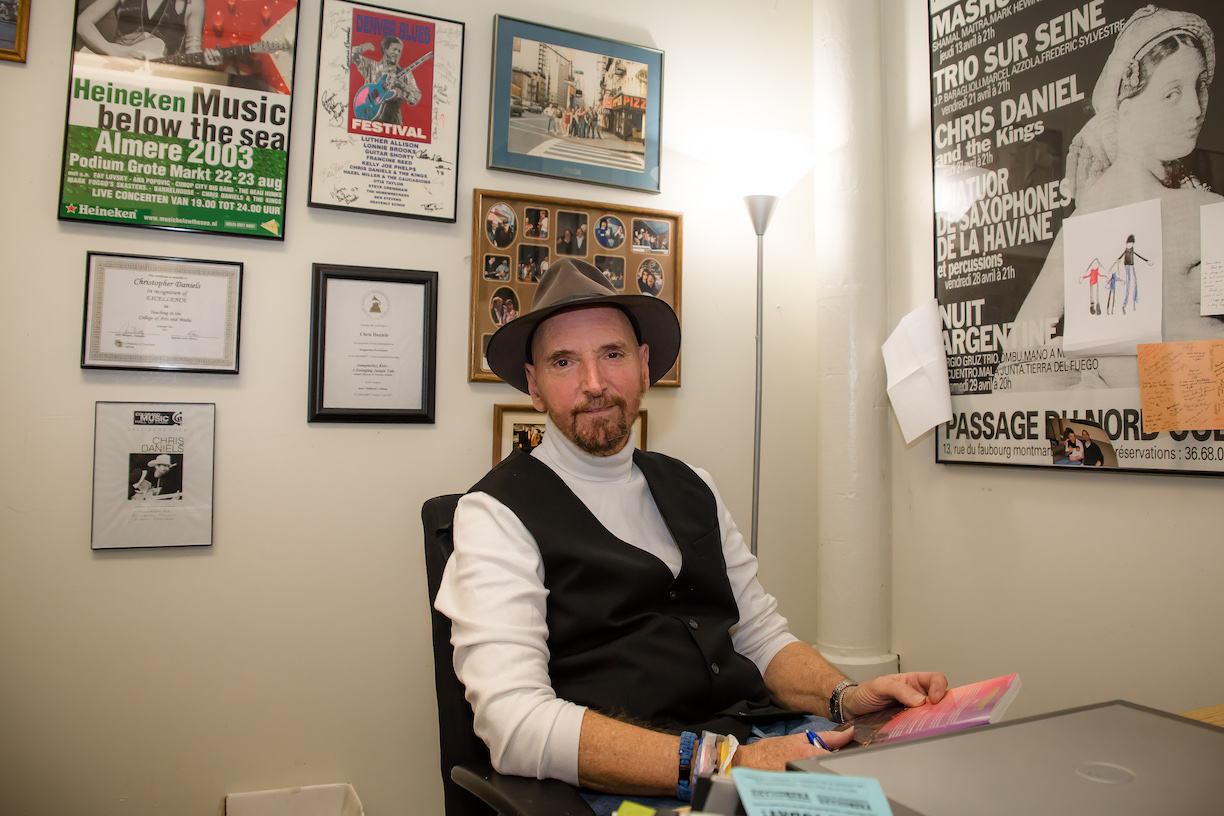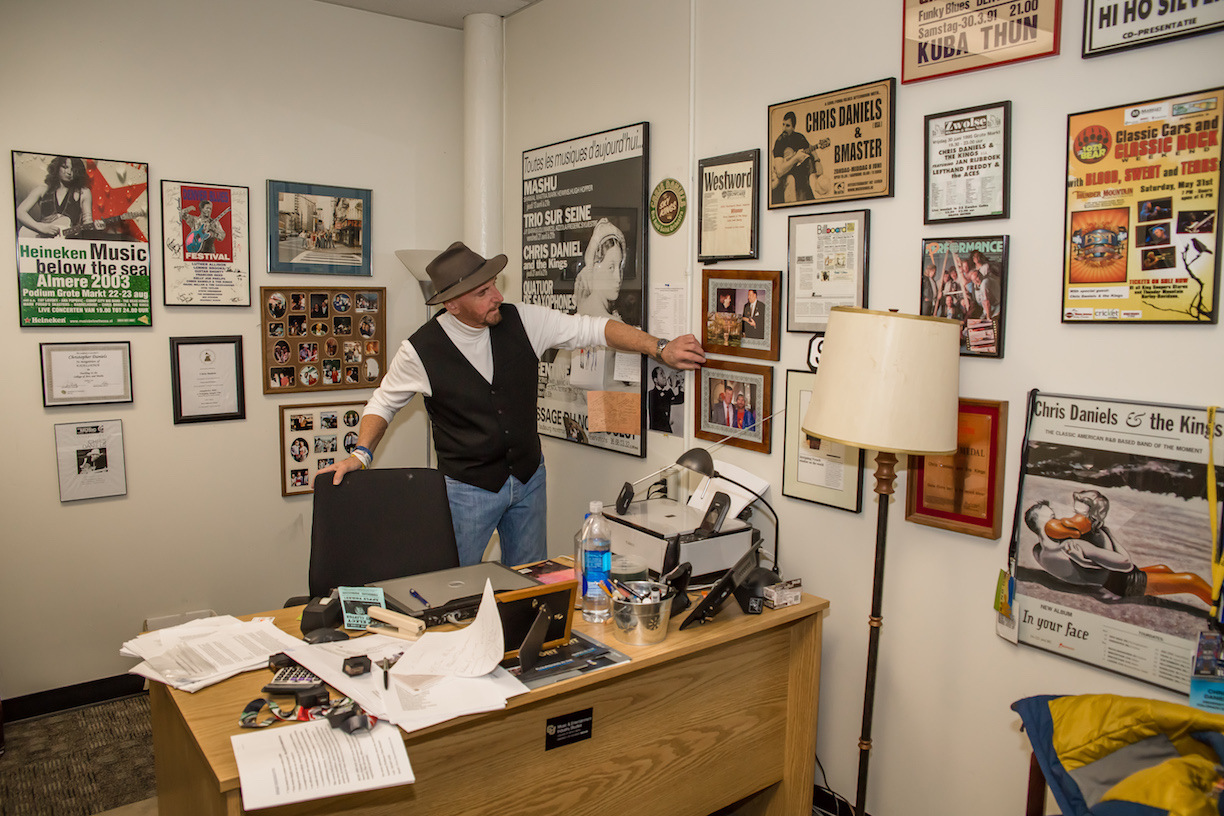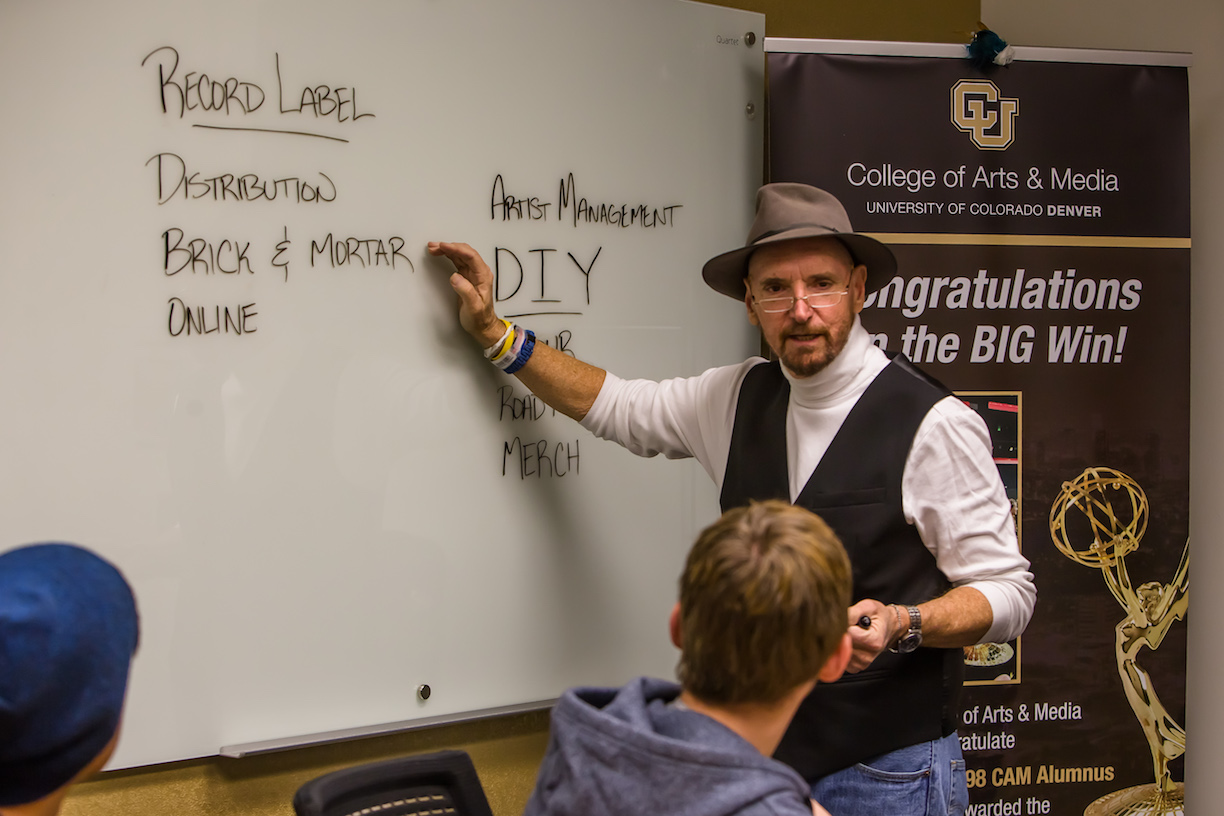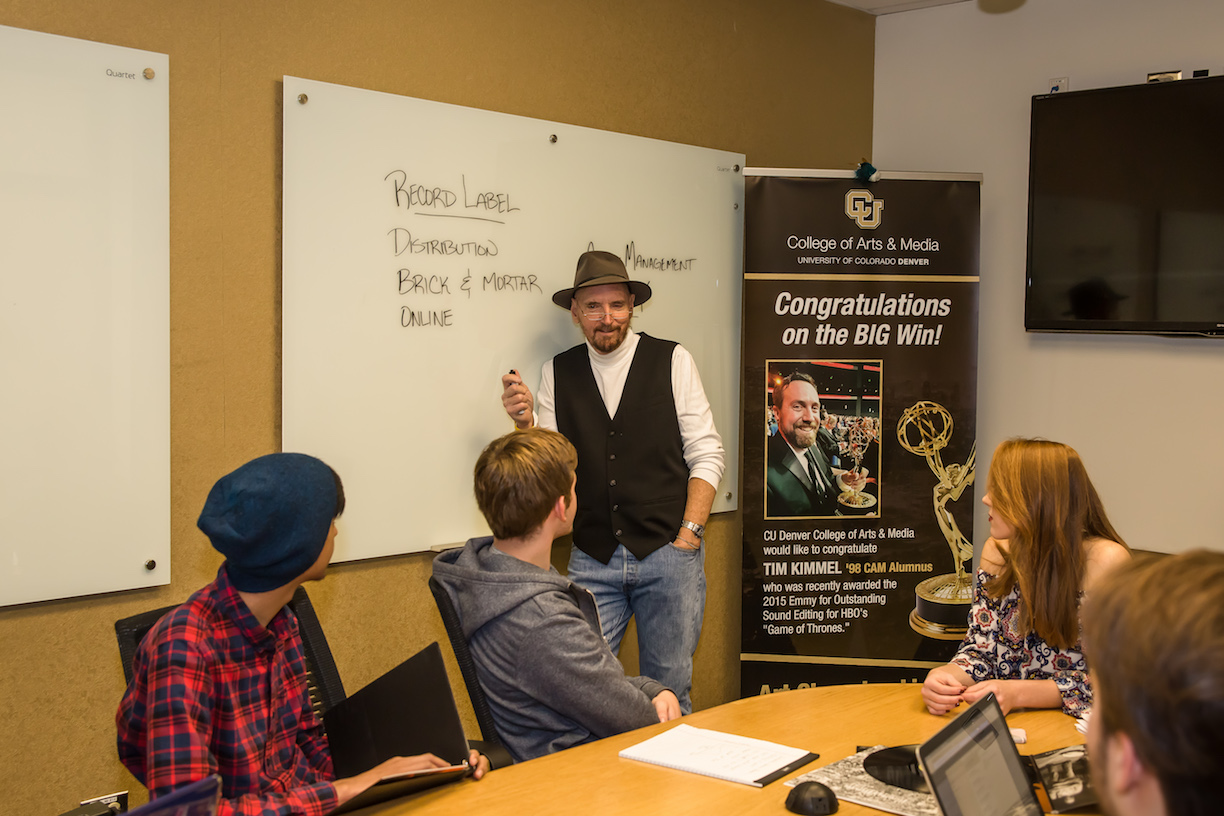The music industry can be a scary place for young artists who are just trying to navigate through the always changing business. Chris Daniels, a long time veteran of the Colorado music scene, spent the majority of his life learning and experiencing the good and bad of the music industry. By combining his music industry experience with his passion for teaching, Daniels set out to educate up-and-coming bands. Over the last 16 years of the musician’s lengthy career, Daniels spent his time training the music industry students of The University of Colorado (CU) Denver.
As Daniels prepares to leave his professorship at CU Denver, 303 Magazine writer and former student of Daniels, Mike Tritsch, sat down with the new Colorado Music Hall of Fame director to discuss Daniels’ journey into the Colorado music scene, playing with legendary musicians and what comes next for the Music Hall of Fame.
303 Magazine: First and foremost, can you explain your new position at the Colorado Music Hall of Fame?
Chris Daniels: I’m the director [there]. The Colorado Music Hall of Fame started in 2011 and it was the dream of Chuck Morris and the original director, G. Brown who had been a reporter for many, many, many years covering music at The Denver Post and a lot of other people too, like Paul Epstein from Twist & Shout and all these people who just love the Colorado music scene. The idea originally was just to basically do three things. One was to celebrate all these incredible artists that have come out of Colorado or have been part of Colorado in some way or another. The second part of it was to be able to do the history and to help [preserve]. Our mission is to preserve, but it’s sort of more than that. It’s basically preserving the legacy of those artists. Then the third part of it is to educate and [that] involves the future because it’s basically saying to other artists, “look, these folks did it and they didn’t come from big, fancy backgrounds and they were just kind of regular people that changed the music business as we know it.”
303: When were you inducted into the Colorado Music Hall of Fame?
CD: I was inducted in 2013. I always laugh about it — I’ve spent 34 years with a rhythm and blues band and a horn section, and I was inducted because of my work as a folk musician. [laughs] That was fine. I went in with Judy Collins, who’s probably the best known female folk singer in the world other than Joan Baez. There was a time when Judy Collins, Joan Baez and Joni Mitchell were sort of the three that were really considered the folk superstars, women superstars in folk. So I came out of that era, right at the end of it. I was in a band called Magic Music — Colorado’s first acoustic jam band. We started out in 1970, which was really the tail end of the folk era, but it’s right when James Taylor and a bunch of other people came along, sort of at the end of a really strong psychedelic rock era. There was sort of a moment after Woodstock where people wanted a more mellow sound and so that became sort of THE sound of the country for a very short period of time, about five years. We were right in the middle of it.
READ: All of the 2018 Red Rocks Shows Announced So Far

303: You’ve had quite the career. I know that personally because I’ve had you as a teacher and a mentor. From battling cancer and winning, to your work at Swallow Hill and even having a hall named after you there, being a musician and a businessman running your artist career, being a successful touring musician, and then an educator on top of all that. What have you taken away from each of those experiences?
CD: Well, it’s probably a book. [Laughs]. I think the thing that sort of guided me all the way along was my first love of playing guitar. It led me to lots of different things — having a folk band, an acoustic sort of jam band, touring with Russell Smith and The Amazing Rhythm Aces, playing guitar for David Johansen before he joined the New York Dolls, 34 years with my own band — Chris Daniels and The Kings — and then touring Europe 21 times. While I was touring, I got clean and sober back about 33 years ago, and so when we were touring a lot with the Kings, I wasn’t going out partying. So, that’s when I went and got my master’s degree.
Right after I finished that, Swallow Hill hired me to be their executive director and a very nice guy named Seth basically taught me how to be an executive director, and it’s a lot like running a band. It’s working with people who maybe are not all pulling the same direction and getting them to pull the same direction. That’s the same thing with the Colorado Music Hall of Fame. But also as far as educating goes, I got my master’s and I really wanted to teach, partly because the first band I was in made every mistake you can make in the music business. They just got deals handed to them from Asylum Records and from all of these major companies and from Bug Music Publishing in Nashville and what later became Rounder Records and they screwed them all up not because they were stupid, but because they didn’t have any advice cause nobody sat down and said, “this is important.” So, that’s why I got into the music business and teaching it. I wanted to see young students know enough to be able to get that contract set in front of them and know what they’re reading.
303: That real-world experience that you have has taught me a lot about the music industry. I am one of those young students of the music industry and I’m still trying to make a name for myself. If you could go back to your 21-year-old self what piece of advice would you give yourself in the music industry?
CD: Well, it’s changed. 18 short years ago in 2000, the major labels were still players and you had to go through one of those machines in order to get out to the public — if you really wanted that. Except for the Adelles of the world, that machine has kind of gone away. So we now have the ability as artists to go direct to the public, but the problem is monetizing it. So that’s a lot of what I teach is to figure out ways to monetize what you’re doing. There are some new models. Jack Conte from a band called Pamplamoose is working with basically a patronage model, or a membership model. I think that may be where we eventually come to, where people find you through Spotify, find out about you, become aware of you, get involved with your music and then they start to take some kind of action like coming to one of your shows. Then the next thing that I think will get in place is a kind of membership where you become a member or a patron of whatever artists that is. I think that kind of patronage is eventually going to replace what was the record sale revenue, which is gone. That revenue is gone, that ship has sailed. So that’s what I’m hoping for on that side of it, but it puts a lot of pressure on two other revenue streams which are publishing and getting your music into the use of any kind out there and playing live.
READ: 10 Tips For Your First Music Recording Session From a Local Pro
This summer, Red Rocks is going to probably have over 150 shows, which is unfathomable if you think about it. That’s basically a show every single day. Right now, if you wanted to do a show at Red Rocks, there’s a three-year waiting list before you could even get a date. We have a great market here, but the live music scene is definitely where the pressure is now for most artists make their money. If I were 21 and had a band right now, I would focus on three things. Number one, I’d focus on a social media package from Instagram to Band Camp to Facebook to all of it and my website to create as much revenue and as much fan involvement as I could do through that. Two, I’d focus on both Youtube and Spotify, getting out there as best as I could to get my music in the hands of as many people as I could. Three, I’d have the best damn live show that you could ever do because the bands that are coming out of here that are doing well, they worked at it for a long period of time and what they did is they created a buzz about what they were doing in the local scene. They had all those other tools, they had the social media stuff [and] their music on all of the possible outlets, but it was really about the live performance and getting out and creating a name for themselves, and this market is good for that.
303: Where and when was your first gig in Colorado?
CD: It was at Tulagi’s in Boulder and it would’ve been about 1971. I was actually opening for Magic Music. I was opening for Magic Music at Tulagi’s and it was me and then it was Magic Music and then I think it was Rusty Kershaw who was Doug Kershaw’s brother.
303: What would you say is your favorite thing about the Colorado music scene?
CD: Well, that’s a really good question. The players. I’ve lived in other places. I’ve lived in Minneapolis, I’ve lived in San Francisco, I’ve lived in New York, lived on Martha’s Vineyard and in all those places, I never felt I got to the A-list players to start working with them. In Colorado, I got here and instantaneously I was working with the A-list players. In fact, one of the things that happened with Chris Daniels & the Kings is the band is so good and so hot that people wanted to come and sit in with us. So over the years, I’ve had everybody from Lyle Lovett to, boy you name it, to Vince Gill. Last summer, we were the backup band for Garth Brooks at Fiddler’s Green. I mean, and that’s not because of me, it’s because of the players in the band. I mean, these are world-class players in Colorado.
303: Where do you see the Colorado music scene headed in the next year, five years or even 10 years?
CD: Well, I think it’s healthy. I asked Chuck Morris and I said, “how can you do 150 shows at Red Rocks?” He said, “much of that is because of the marijuana industry… if you think about it, we have a tourist industry that’s built around people coming to Colorado, in a way they used to go to Amsterdam, to enjoy some weed, to go to a phenomenal concert at Red Rocks, to get up in the mountains and hike or ride a bike or whatever.” And it’s really fueling the industry. So I think the live industry is going to continue to be strong. I don’t think the record business has a chance ANYWHERE. I think record businesses for awhile are going to be an ancillary thing. So the direct-to-fan approach for artists is going to be there. But what I do hope to see, we had a great publishing company for a while named Lyric House here and I’d love to see one develop again where they’re working with Colorado artists to get their music into TV and webisodes and all that kind of stuff. That’s what I’d like to see.
303: If you could change one thing about the Denver music scene, what would you change about it?
CD: Well, a lot of years ago I would’ve said that it was the competition between artists. There was a real backstabbing kind of thing going on. That was the late ’90s. Now what I see is the co-op and this cooperative thing, [it’s a] great interchange. I think the most difficult thing that I’d like to see change for the music business here is to get a publishing company in here and more managers and people who have access to the national market. As much as we’re a destination city for touring, we’re still kind of a flyover state when it comes to the business. People [think] “I got to go to Nashville or I got to go to LA or I got to go to Austin” and I want to see the businesses that are in those cities, the music businesses, the publishing companies and record labels, if nothing else, establish branch offices here. I think they could do that.
One of the things that I hope to do with the Colorado Music Hall of Fame is taking the education part of it and really promote artists. There are lots of things that promote great local talent, but I think that’s one of the things that the Colorado Music Hall of Fame has got to do. .
303: What do you want people to know about the Colorado Music Hall of Fame?
CD: Three things. One, we celebrate everything from hot rise bluegrass to Latin music. So we have this incredible ability. Two, it’s going to take us a while. There’s so much great music that’s coming out of Colorado right now. Three, one of our biggest problems is we are up at the [Red Rocks] Trading Post and we love being there, but we’re basically a room at their site and you know, that’s the Denver site that the city owns and they’ve been so sweet to us to partner with us and with Aramark. But we need a home of our own, whether we build up there or we find a place down here, in the next five years, we’ve got to have a physical home.
And as I said, the other part of it is just the future. What we really want to do is promote this music so the young people go, “wow, I heard String Cheese [Incident] is in the Colorado Music Hall of Fame. Let me go learn about them so I can figure out how they did it because I’m a jam band or The Flobots or 3Oh!3 because I’m a hip-hop artist.” Whatever it is, they can go. They can use us as a resource. I want them to know how 3Oh!3 got where they were, or Pretty Lights. How did Pretty Lights happen? They can come to the Colorado Music Hall of Fame to find that out.



